Reflective Learning: Feedback & Feedforward in Higher Education
VerifiedAdded on 2023/06/16
|8
|2192
|267
Essay
AI Summary
This essay explores the significance of reflective learning, particularly within the context of higher education. It emphasizes how a reflective approach, incorporating feedback and feedforward mechanisms, can substantially enhance formative assessment. The essay delves into the GIBBS Reflective Cycle as a structured method for analyzing personal experiences and skills to promote learning and self-awareness. It distinguishes between feedback, which provides reviews on current performance, and feedforward, which offers guidance for future improvement. By integrating these techniques, students can identify their strengths and weaknesses, address challenges, and ultimately improve their academic performance and future career prospects. The essay concludes that reflective learning, combined with effective feedback and feedforward, is essential for continuous improvement and the development of skilled and effective practices in both academic and professional settings.
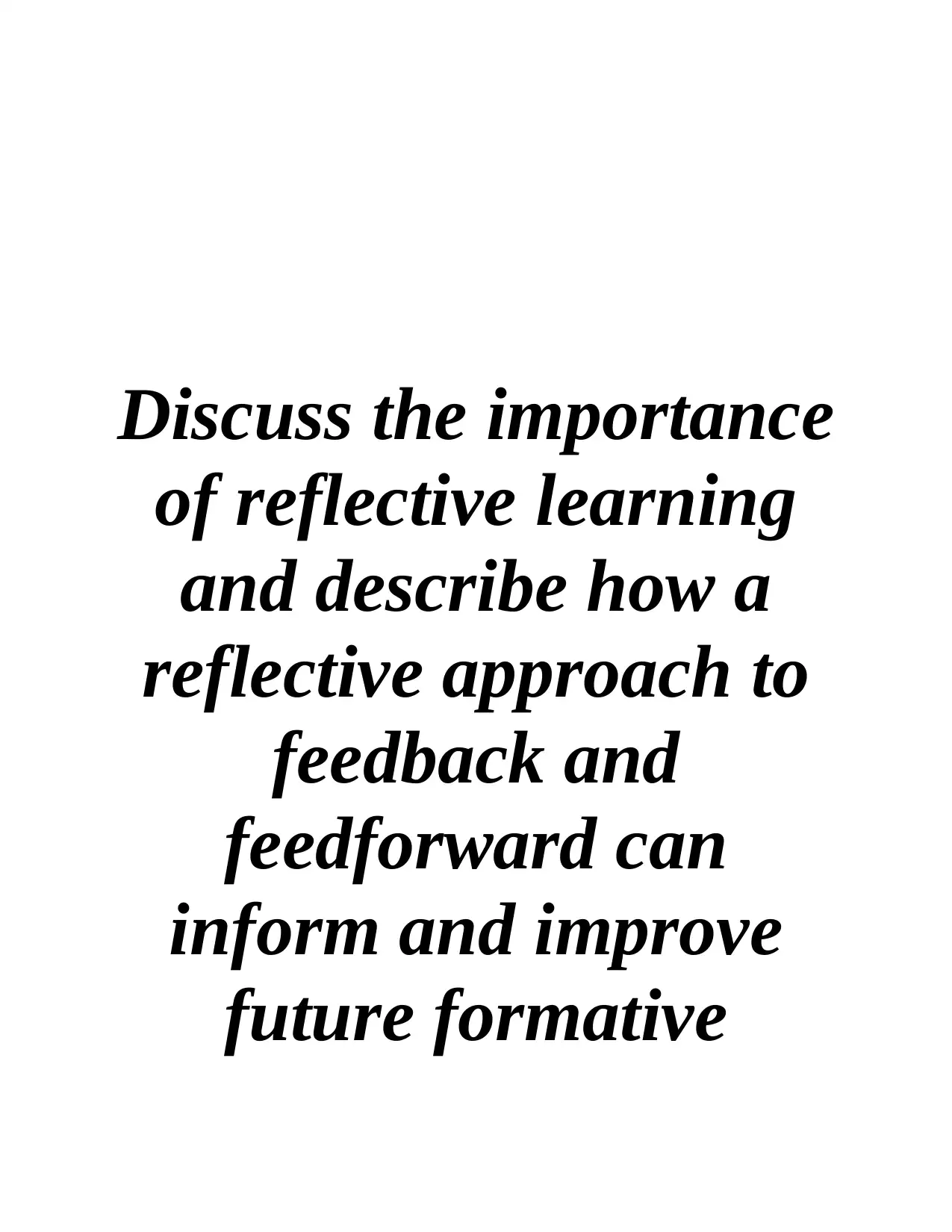
Discuss the importance
of reflective learning
and describe how a
reflective approach to
feedback and
feedforward can
inform and improve
future formative
of reflective learning
and describe how a
reflective approach to
feedback and
feedforward can
inform and improve
future formative
Paraphrase This Document
Need a fresh take? Get an instant paraphrase of this document with our AI Paraphraser
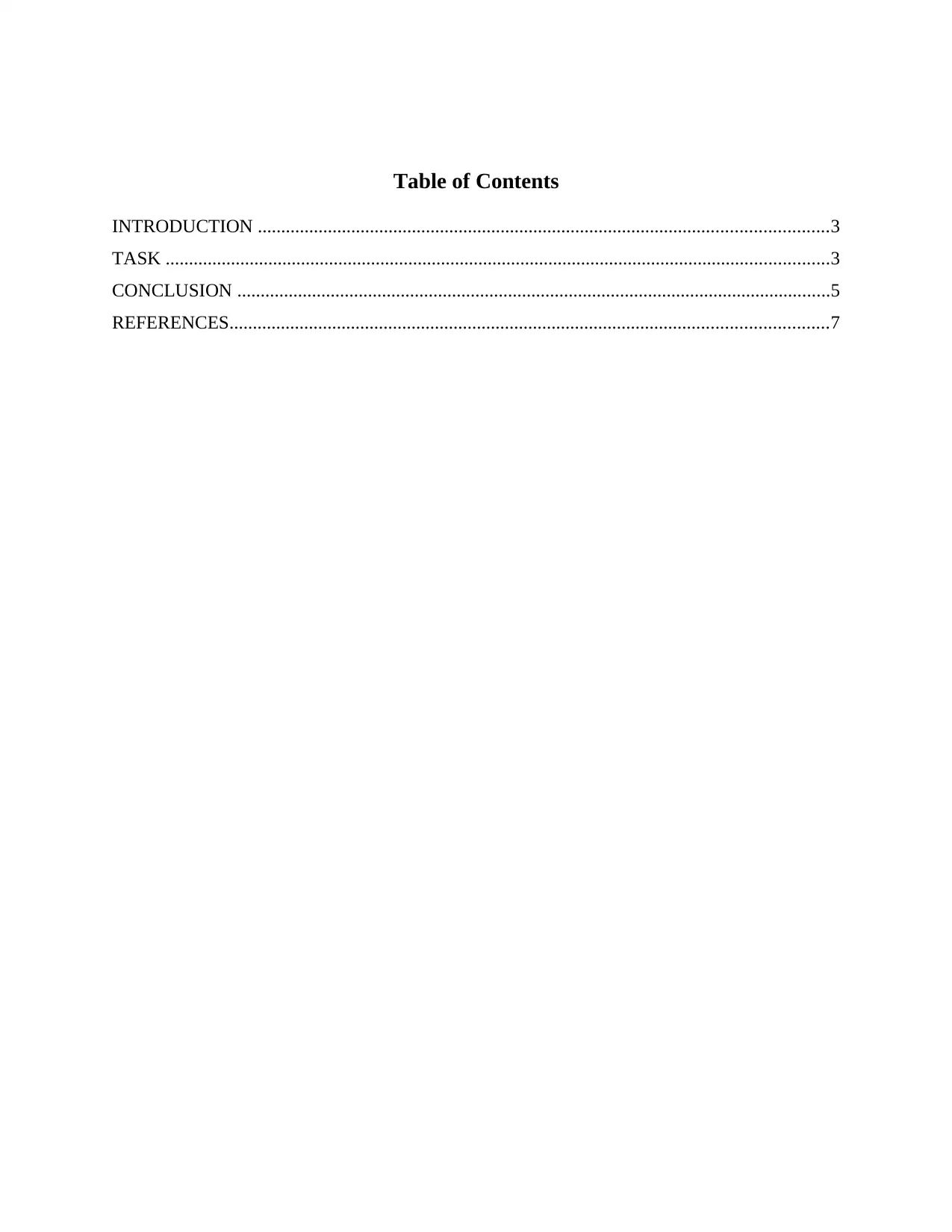
Table of Contents
INTRODUCTION ..........................................................................................................................3
TASK ..............................................................................................................................................3
CONCLUSION ...............................................................................................................................5
REFERENCES................................................................................................................................7
INTRODUCTION ..........................................................................................................................3
TASK ..............................................................................................................................................3
CONCLUSION ...............................................................................................................................5
REFERENCES................................................................................................................................7
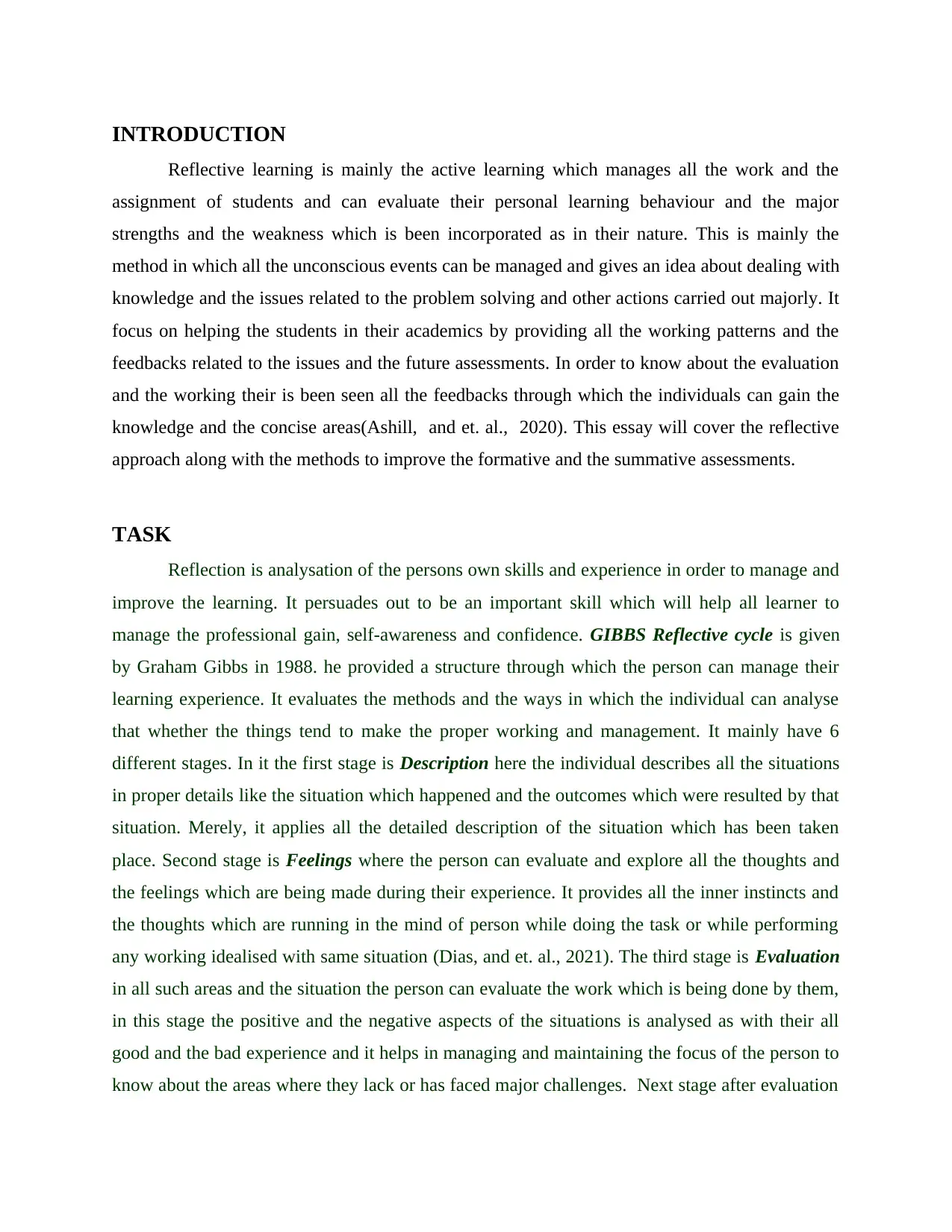
INTRODUCTION
Reflective learning is mainly the active learning which manages all the work and the
assignment of students and can evaluate their personal learning behaviour and the major
strengths and the weakness which is been incorporated as in their nature. This is mainly the
method in which all the unconscious events can be managed and gives an idea about dealing with
knowledge and the issues related to the problem solving and other actions carried out majorly. It
focus on helping the students in their academics by providing all the working patterns and the
feedbacks related to the issues and the future assessments. In order to know about the evaluation
and the working their is been seen all the feedbacks through which the individuals can gain the
knowledge and the concise areas(Ashill, and et. al., 2020). This essay will cover the reflective
approach along with the methods to improve the formative and the summative assessments.
TASK
Reflection is analysation of the persons own skills and experience in order to manage and
improve the learning. It persuades out to be an important skill which will help all learner to
manage the professional gain, self-awareness and confidence. GIBBS Reflective cycle is given
by Graham Gibbs in 1988. he provided a structure through which the person can manage their
learning experience. It evaluates the methods and the ways in which the individual can analyse
that whether the things tend to make the proper working and management. It mainly have 6
different stages. In it the first stage is Description here the individual describes all the situations
in proper details like the situation which happened and the outcomes which were resulted by that
situation. Merely, it applies all the detailed description of the situation which has been taken
place. Second stage is Feelings where the person can evaluate and explore all the thoughts and
the feelings which are being made during their experience. It provides all the inner instincts and
the thoughts which are running in the mind of person while doing the task or while performing
any working idealised with same situation (Dias, and et. al., 2021). The third stage is Evaluation
in all such areas and the situation the person can evaluate the work which is being done by them,
in this stage the positive and the negative aspects of the situations is analysed as with their all
good and the bad experience and it helps in managing and maintaining the focus of the person to
know about the areas where they lack or has faced major challenges. Next stage after evaluation
Reflective learning is mainly the active learning which manages all the work and the
assignment of students and can evaluate their personal learning behaviour and the major
strengths and the weakness which is been incorporated as in their nature. This is mainly the
method in which all the unconscious events can be managed and gives an idea about dealing with
knowledge and the issues related to the problem solving and other actions carried out majorly. It
focus on helping the students in their academics by providing all the working patterns and the
feedbacks related to the issues and the future assessments. In order to know about the evaluation
and the working their is been seen all the feedbacks through which the individuals can gain the
knowledge and the concise areas(Ashill, and et. al., 2020). This essay will cover the reflective
approach along with the methods to improve the formative and the summative assessments.
TASK
Reflection is analysation of the persons own skills and experience in order to manage and
improve the learning. It persuades out to be an important skill which will help all learner to
manage the professional gain, self-awareness and confidence. GIBBS Reflective cycle is given
by Graham Gibbs in 1988. he provided a structure through which the person can manage their
learning experience. It evaluates the methods and the ways in which the individual can analyse
that whether the things tend to make the proper working and management. It mainly have 6
different stages. In it the first stage is Description here the individual describes all the situations
in proper details like the situation which happened and the outcomes which were resulted by that
situation. Merely, it applies all the detailed description of the situation which has been taken
place. Second stage is Feelings where the person can evaluate and explore all the thoughts and
the feelings which are being made during their experience. It provides all the inner instincts and
the thoughts which are running in the mind of person while doing the task or while performing
any working idealised with same situation (Dias, and et. al., 2021). The third stage is Evaluation
in all such areas and the situation the person can evaluate the work which is being done by them,
in this stage the positive and the negative aspects of the situations is analysed as with their all
good and the bad experience and it helps in managing and maintaining the focus of the person to
know about the areas where they lack or has faced major challenges. Next stage after evaluation
⊘ This is a preview!⊘
Do you want full access?
Subscribe today to unlock all pages.

Trusted by 1+ million students worldwide
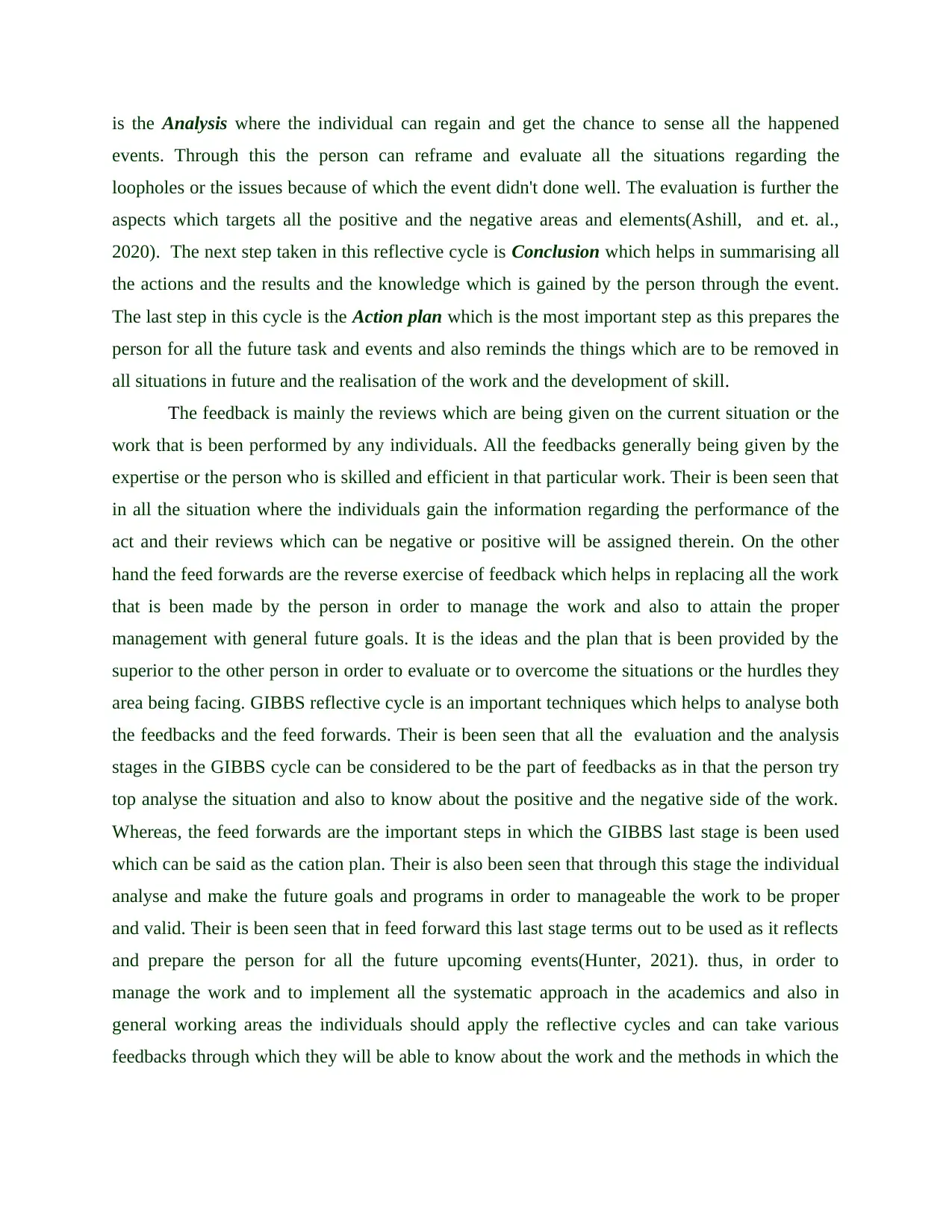
is the Analysis where the individual can regain and get the chance to sense all the happened
events. Through this the person can reframe and evaluate all the situations regarding the
loopholes or the issues because of which the event didn't done well. The evaluation is further the
aspects which targets all the positive and the negative areas and elements(Ashill, and et. al.,
2020). The next step taken in this reflective cycle is Conclusion which helps in summarising all
the actions and the results and the knowledge which is gained by the person through the event.
The last step in this cycle is the Action plan which is the most important step as this prepares the
person for all the future task and events and also reminds the things which are to be removed in
all situations in future and the realisation of the work and the development of skill.
The feedback is mainly the reviews which are being given on the current situation or the
work that is been performed by any individuals. All the feedbacks generally being given by the
expertise or the person who is skilled and efficient in that particular work. Their is been seen that
in all the situation where the individuals gain the information regarding the performance of the
act and their reviews which can be negative or positive will be assigned therein. On the other
hand the feed forwards are the reverse exercise of feedback which helps in replacing all the work
that is been made by the person in order to manage the work and also to attain the proper
management with general future goals. It is the ideas and the plan that is been provided by the
superior to the other person in order to evaluate or to overcome the situations or the hurdles they
area being facing. GIBBS reflective cycle is an important techniques which helps to analyse both
the feedbacks and the feed forwards. Their is been seen that all the evaluation and the analysis
stages in the GIBBS cycle can be considered to be the part of feedbacks as in that the person try
top analyse the situation and also to know about the positive and the negative side of the work.
Whereas, the feed forwards are the important steps in which the GIBBS last stage is been used
which can be said as the cation plan. Their is also been seen that through this stage the individual
analyse and make the future goals and programs in order to manageable the work to be proper
and valid. Their is been seen that in feed forward this last stage terms out to be used as it reflects
and prepare the person for all the future upcoming events(Hunter, 2021). thus, in order to
manage the work and to implement all the systematic approach in the academics and also in
general working areas the individuals should apply the reflective cycles and can take various
feedbacks through which they will be able to know about the work and the methods in which the
events. Through this the person can reframe and evaluate all the situations regarding the
loopholes or the issues because of which the event didn't done well. The evaluation is further the
aspects which targets all the positive and the negative areas and elements(Ashill, and et. al.,
2020). The next step taken in this reflective cycle is Conclusion which helps in summarising all
the actions and the results and the knowledge which is gained by the person through the event.
The last step in this cycle is the Action plan which is the most important step as this prepares the
person for all the future task and events and also reminds the things which are to be removed in
all situations in future and the realisation of the work and the development of skill.
The feedback is mainly the reviews which are being given on the current situation or the
work that is been performed by any individuals. All the feedbacks generally being given by the
expertise or the person who is skilled and efficient in that particular work. Their is been seen that
in all the situation where the individuals gain the information regarding the performance of the
act and their reviews which can be negative or positive will be assigned therein. On the other
hand the feed forwards are the reverse exercise of feedback which helps in replacing all the work
that is been made by the person in order to manage the work and also to attain the proper
management with general future goals. It is the ideas and the plan that is been provided by the
superior to the other person in order to evaluate or to overcome the situations or the hurdles they
area being facing. GIBBS reflective cycle is an important techniques which helps to analyse both
the feedbacks and the feed forwards. Their is been seen that all the evaluation and the analysis
stages in the GIBBS cycle can be considered to be the part of feedbacks as in that the person try
top analyse the situation and also to know about the positive and the negative side of the work.
Whereas, the feed forwards are the important steps in which the GIBBS last stage is been used
which can be said as the cation plan. Their is also been seen that through this stage the individual
analyse and make the future goals and programs in order to manageable the work to be proper
and valid. Their is been seen that in feed forward this last stage terms out to be used as it reflects
and prepare the person for all the future upcoming events(Hunter, 2021). thus, in order to
manage the work and to implement all the systematic approach in the academics and also in
general working areas the individuals should apply the reflective cycles and can take various
feedbacks through which they will be able to know about the work and the methods in which the
Paraphrase This Document
Need a fresh take? Get an instant paraphrase of this document with our AI Paraphraser
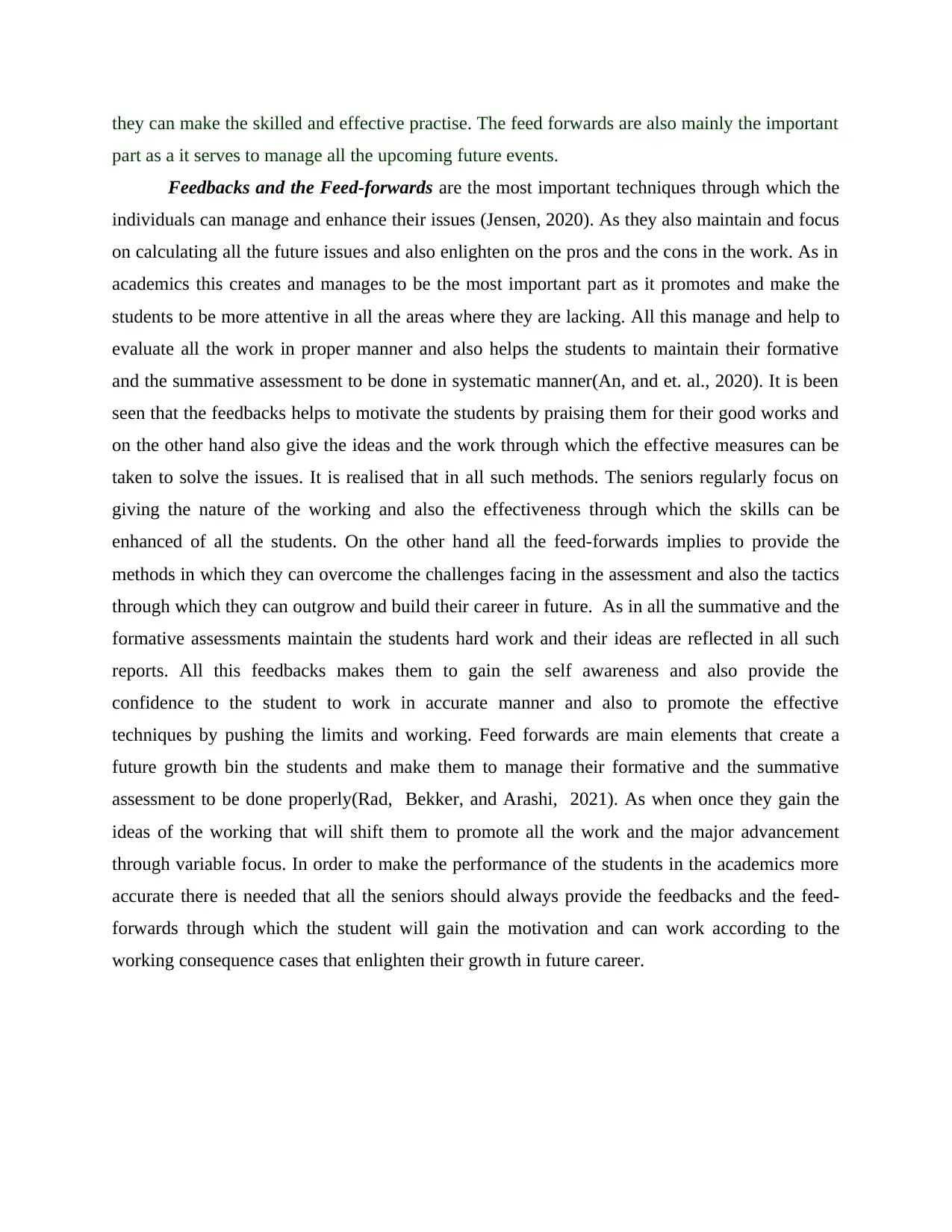
they can make the skilled and effective practise. The feed forwards are also mainly the important
part as a it serves to manage all the upcoming future events.
Feedbacks and the Feed-forwards are the most important techniques through which the
individuals can manage and enhance their issues (Jensen, 2020). As they also maintain and focus
on calculating all the future issues and also enlighten on the pros and the cons in the work. As in
academics this creates and manages to be the most important part as it promotes and make the
students to be more attentive in all the areas where they are lacking. All this manage and help to
evaluate all the work in proper manner and also helps the students to maintain their formative
and the summative assessment to be done in systematic manner(An, and et. al., 2020). It is been
seen that the feedbacks helps to motivate the students by praising them for their good works and
on the other hand also give the ideas and the work through which the effective measures can be
taken to solve the issues. It is realised that in all such methods. The seniors regularly focus on
giving the nature of the working and also the effectiveness through which the skills can be
enhanced of all the students. On the other hand all the feed-forwards implies to provide the
methods in which they can overcome the challenges facing in the assessment and also the tactics
through which they can outgrow and build their career in future. As in all the summative and the
formative assessments maintain the students hard work and their ideas are reflected in all such
reports. All this feedbacks makes them to gain the self awareness and also provide the
confidence to the student to work in accurate manner and also to promote the effective
techniques by pushing the limits and working. Feed forwards are main elements that create a
future growth bin the students and make them to manage their formative and the summative
assessment to be done properly(Rad, Bekker, and Arashi, 2021). As when once they gain the
ideas of the working that will shift them to promote all the work and the major advancement
through variable focus. In order to make the performance of the students in the academics more
accurate there is needed that all the seniors should always provide the feedbacks and the feed-
forwards through which the student will gain the motivation and can work according to the
working consequence cases that enlighten their growth in future career.
part as a it serves to manage all the upcoming future events.
Feedbacks and the Feed-forwards are the most important techniques through which the
individuals can manage and enhance their issues (Jensen, 2020). As they also maintain and focus
on calculating all the future issues and also enlighten on the pros and the cons in the work. As in
academics this creates and manages to be the most important part as it promotes and make the
students to be more attentive in all the areas where they are lacking. All this manage and help to
evaluate all the work in proper manner and also helps the students to maintain their formative
and the summative assessment to be done in systematic manner(An, and et. al., 2020). It is been
seen that the feedbacks helps to motivate the students by praising them for their good works and
on the other hand also give the ideas and the work through which the effective measures can be
taken to solve the issues. It is realised that in all such methods. The seniors regularly focus on
giving the nature of the working and also the effectiveness through which the skills can be
enhanced of all the students. On the other hand all the feed-forwards implies to provide the
methods in which they can overcome the challenges facing in the assessment and also the tactics
through which they can outgrow and build their career in future. As in all the summative and the
formative assessments maintain the students hard work and their ideas are reflected in all such
reports. All this feedbacks makes them to gain the self awareness and also provide the
confidence to the student to work in accurate manner and also to promote the effective
techniques by pushing the limits and working. Feed forwards are main elements that create a
future growth bin the students and make them to manage their formative and the summative
assessment to be done properly(Rad, Bekker, and Arashi, 2021). As when once they gain the
ideas of the working that will shift them to promote all the work and the major advancement
through variable focus. In order to make the performance of the students in the academics more
accurate there is needed that all the seniors should always provide the feedbacks and the feed-
forwards through which the student will gain the motivation and can work according to the
working consequence cases that enlighten their growth in future career.
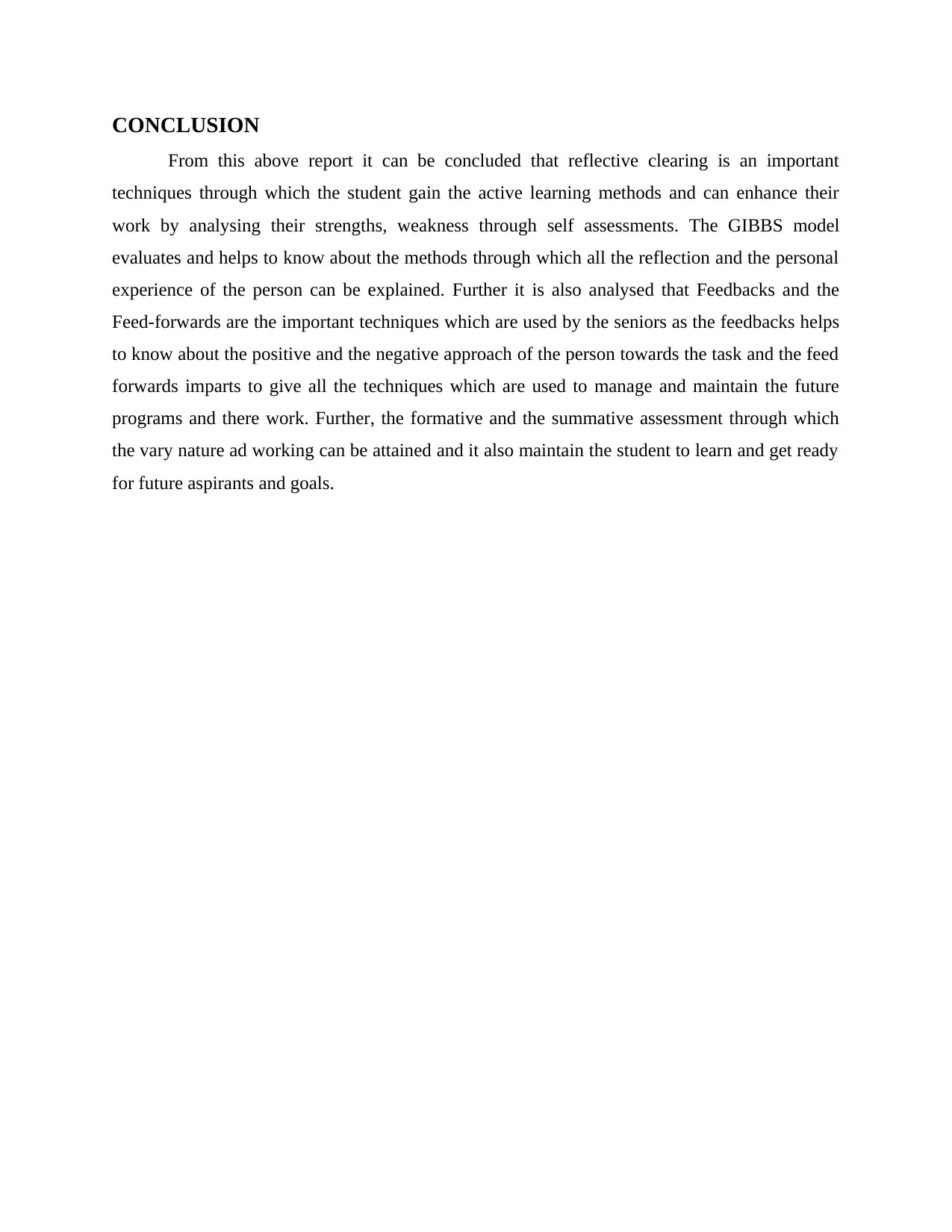
CONCLUSION
From this above report it can be concluded that reflective clearing is an important
techniques through which the student gain the active learning methods and can enhance their
work by analysing their strengths, weakness through self assessments. The GIBBS model
evaluates and helps to know about the methods through which all the reflection and the personal
experience of the person can be explained. Further it is also analysed that Feedbacks and the
Feed-forwards are the important techniques which are used by the seniors as the feedbacks helps
to know about the positive and the negative approach of the person towards the task and the feed
forwards imparts to give all the techniques which are used to manage and maintain the future
programs and there work. Further, the formative and the summative assessment through which
the vary nature ad working can be attained and it also maintain the student to learn and get ready
for future aspirants and goals.
From this above report it can be concluded that reflective clearing is an important
techniques through which the student gain the active learning methods and can enhance their
work by analysing their strengths, weakness through self assessments. The GIBBS model
evaluates and helps to know about the methods through which all the reflection and the personal
experience of the person can be explained. Further it is also analysed that Feedbacks and the
Feed-forwards are the important techniques which are used by the seniors as the feedbacks helps
to know about the positive and the negative approach of the person towards the task and the feed
forwards imparts to give all the techniques which are used to manage and maintain the future
programs and there work. Further, the formative and the summative assessment through which
the vary nature ad working can be attained and it also maintain the student to learn and get ready
for future aspirants and goals.
⊘ This is a preview!⊘
Do you want full access?
Subscribe today to unlock all pages.

Trusted by 1+ million students worldwide
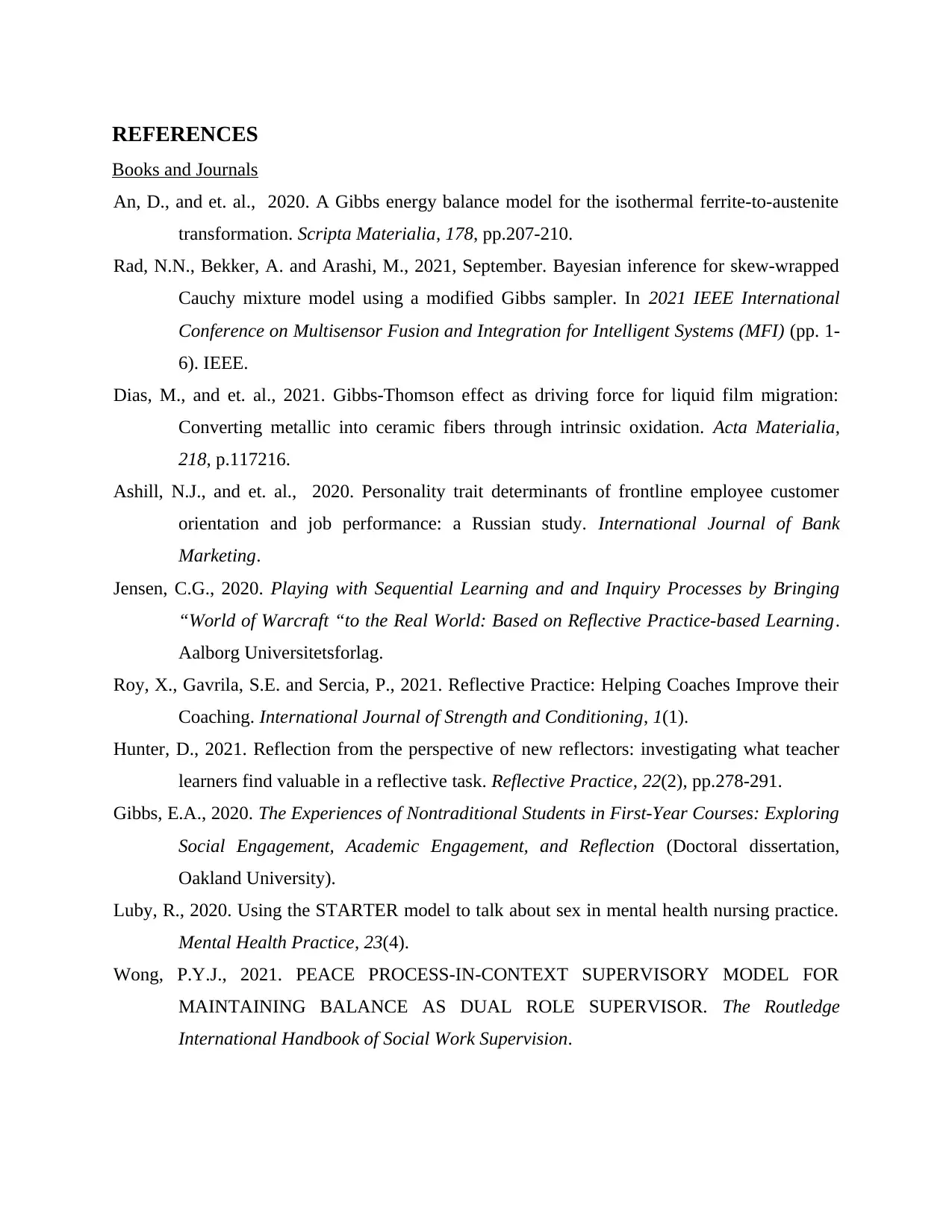
REFERENCES
Books and Journals
An, D., and et. al., 2020. A Gibbs energy balance model for the isothermal ferrite-to-austenite
transformation. Scripta Materialia, 178, pp.207-210.
Rad, N.N., Bekker, A. and Arashi, M., 2021, September. Bayesian inference for skew-wrapped
Cauchy mixture model using a modified Gibbs sampler. In 2021 IEEE International
Conference on Multisensor Fusion and Integration for Intelligent Systems (MFI) (pp. 1-
6). IEEE.
Dias, M., and et. al., 2021. Gibbs-Thomson effect as driving force for liquid film migration:
Converting metallic into ceramic fibers through intrinsic oxidation. Acta Materialia,
218, p.117216.
Ashill, N.J., and et. al., 2020. Personality trait determinants of frontline employee customer
orientation and job performance: a Russian study. International Journal of Bank
Marketing.
Jensen, C.G., 2020. Playing with Sequential Learning and and Inquiry Processes by Bringing
“World of Warcraft “to the Real World: Based on Reflective Practice-based Learning.
Aalborg Universitetsforlag.
Roy, X., Gavrila, S.E. and Sercia, P., 2021. Reflective Practice: Helping Coaches Improve their
Coaching. International Journal of Strength and Conditioning, 1(1).
Hunter, D., 2021. Reflection from the perspective of new reflectors: investigating what teacher
learners find valuable in a reflective task. Reflective Practice, 22(2), pp.278-291.
Gibbs, E.A., 2020. The Experiences of Nontraditional Students in First-Year Courses: Exploring
Social Engagement, Academic Engagement, and Reflection (Doctoral dissertation,
Oakland University).
Luby, R., 2020. Using the STARTER model to talk about sex in mental health nursing practice.
Mental Health Practice, 23(4).
Wong, P.Y.J., 2021. PEACE PROCESS-IN-CONTEXT SUPERVISORY MODEL FOR
MAINTAINING BALANCE AS DUAL ROLE SUPERVISOR. The Routledge
International Handbook of Social Work Supervision.
Books and Journals
An, D., and et. al., 2020. A Gibbs energy balance model for the isothermal ferrite-to-austenite
transformation. Scripta Materialia, 178, pp.207-210.
Rad, N.N., Bekker, A. and Arashi, M., 2021, September. Bayesian inference for skew-wrapped
Cauchy mixture model using a modified Gibbs sampler. In 2021 IEEE International
Conference on Multisensor Fusion and Integration for Intelligent Systems (MFI) (pp. 1-
6). IEEE.
Dias, M., and et. al., 2021. Gibbs-Thomson effect as driving force for liquid film migration:
Converting metallic into ceramic fibers through intrinsic oxidation. Acta Materialia,
218, p.117216.
Ashill, N.J., and et. al., 2020. Personality trait determinants of frontline employee customer
orientation and job performance: a Russian study. International Journal of Bank
Marketing.
Jensen, C.G., 2020. Playing with Sequential Learning and and Inquiry Processes by Bringing
“World of Warcraft “to the Real World: Based on Reflective Practice-based Learning.
Aalborg Universitetsforlag.
Roy, X., Gavrila, S.E. and Sercia, P., 2021. Reflective Practice: Helping Coaches Improve their
Coaching. International Journal of Strength and Conditioning, 1(1).
Hunter, D., 2021. Reflection from the perspective of new reflectors: investigating what teacher
learners find valuable in a reflective task. Reflective Practice, 22(2), pp.278-291.
Gibbs, E.A., 2020. The Experiences of Nontraditional Students in First-Year Courses: Exploring
Social Engagement, Academic Engagement, and Reflection (Doctoral dissertation,
Oakland University).
Luby, R., 2020. Using the STARTER model to talk about sex in mental health nursing practice.
Mental Health Practice, 23(4).
Wong, P.Y.J., 2021. PEACE PROCESS-IN-CONTEXT SUPERVISORY MODEL FOR
MAINTAINING BALANCE AS DUAL ROLE SUPERVISOR. The Routledge
International Handbook of Social Work Supervision.
Paraphrase This Document
Need a fresh take? Get an instant paraphrase of this document with our AI Paraphraser
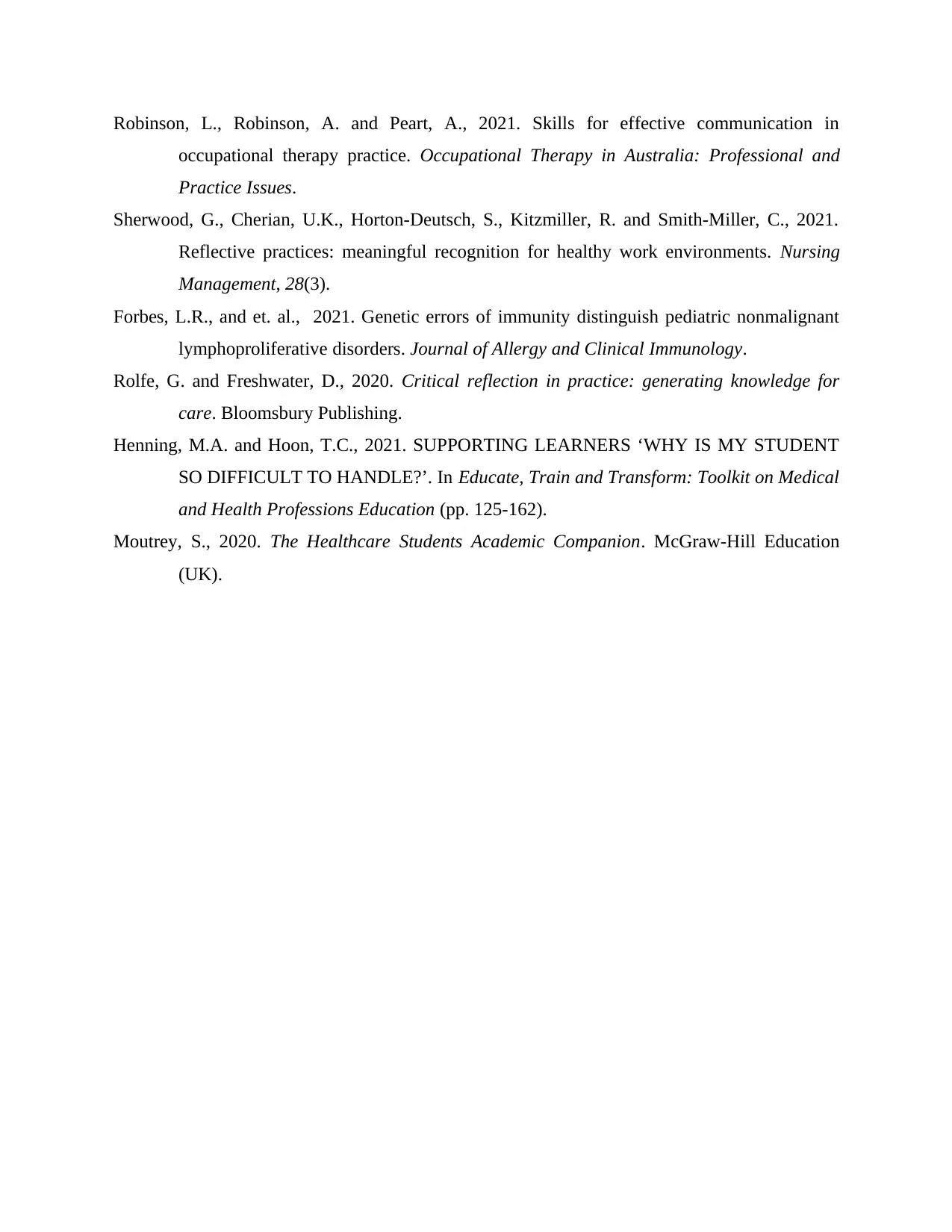
Robinson, L., Robinson, A. and Peart, A., 2021. Skills for effective communication in
occupational therapy practice. Occupational Therapy in Australia: Professional and
Practice Issues.
Sherwood, G., Cherian, U.K., Horton-Deutsch, S., Kitzmiller, R. and Smith-Miller, C., 2021.
Reflective practices: meaningful recognition for healthy work environments. Nursing
Management, 28(3).
Forbes, L.R., and et. al., 2021. Genetic errors of immunity distinguish pediatric nonmalignant
lymphoproliferative disorders. Journal of Allergy and Clinical Immunology.
Rolfe, G. and Freshwater, D., 2020. Critical reflection in practice: generating knowledge for
care. Bloomsbury Publishing.
Henning, M.A. and Hoon, T.C., 2021. SUPPORTING LEARNERS ‘WHY IS MY STUDENT
SO DIFFICULT TO HANDLE?’. In Educate, Train and Transform: Toolkit on Medical
and Health Professions Education (pp. 125-162).
Moutrey, S., 2020. The Healthcare Students Academic Companion. McGraw-Hill Education
(UK).
occupational therapy practice. Occupational Therapy in Australia: Professional and
Practice Issues.
Sherwood, G., Cherian, U.K., Horton-Deutsch, S., Kitzmiller, R. and Smith-Miller, C., 2021.
Reflective practices: meaningful recognition for healthy work environments. Nursing
Management, 28(3).
Forbes, L.R., and et. al., 2021. Genetic errors of immunity distinguish pediatric nonmalignant
lymphoproliferative disorders. Journal of Allergy and Clinical Immunology.
Rolfe, G. and Freshwater, D., 2020. Critical reflection in practice: generating knowledge for
care. Bloomsbury Publishing.
Henning, M.A. and Hoon, T.C., 2021. SUPPORTING LEARNERS ‘WHY IS MY STUDENT
SO DIFFICULT TO HANDLE?’. In Educate, Train and Transform: Toolkit on Medical
and Health Professions Education (pp. 125-162).
Moutrey, S., 2020. The Healthcare Students Academic Companion. McGraw-Hill Education
(UK).
1 out of 8
Related Documents
Your All-in-One AI-Powered Toolkit for Academic Success.
+13062052269
info@desklib.com
Available 24*7 on WhatsApp / Email
![[object Object]](/_next/static/media/star-bottom.7253800d.svg)
Unlock your academic potential
Copyright © 2020–2026 A2Z Services. All Rights Reserved. Developed and managed by ZUCOL.



